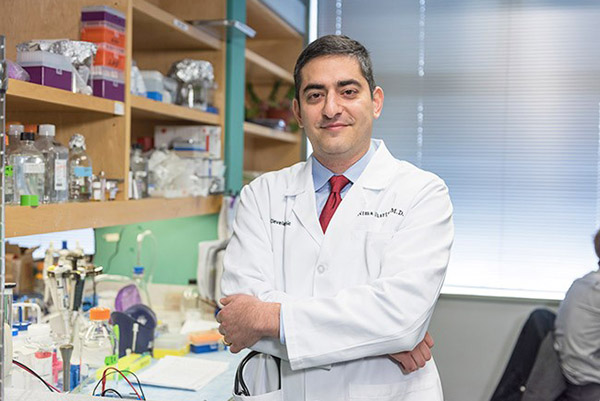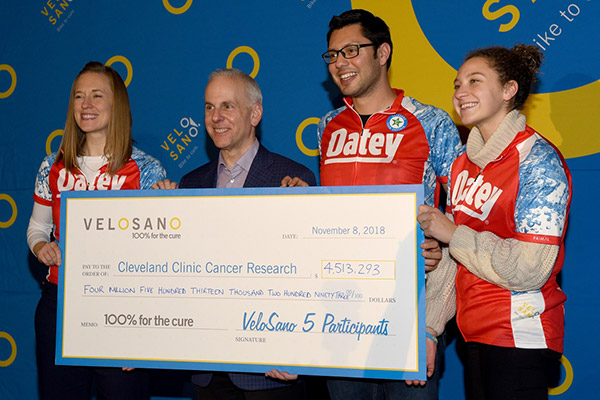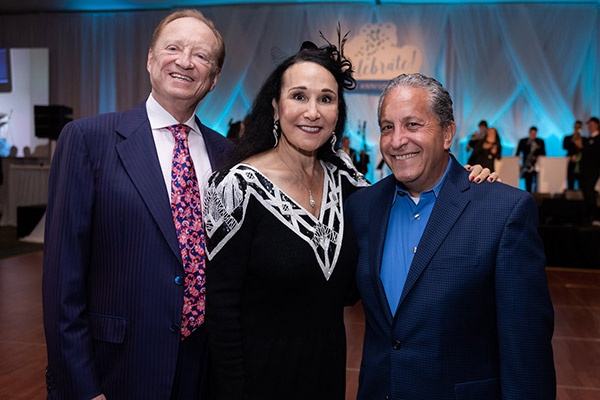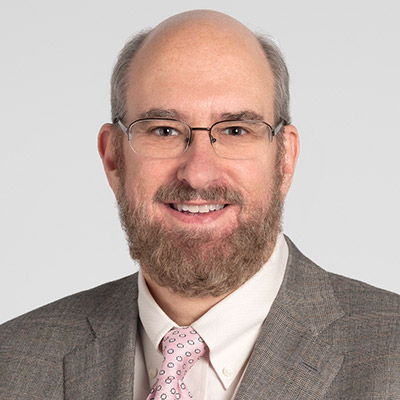$1M Prostate Cancer Foundation Challenge Award for Drug Development Team

Nima Sharifi, MD, has a confession: He’s always thinking about work.
“I know a lot of my team members are the same way,” says Dr. Sharifi. “We’re driven by two things. First, an intrinsic curiosity to know what the answers are. And second, the desire to make things better. Ultimately, that’s what it boils down to – wanting to make things better.”
Dr. Sharifi has dedicated his career to studying prostate cancer. He recently was honored with the Prostate Cancer Foundation Challenge Award, the second time in four years he’s received the highly competitive grant. The award is given to multidisciplinary teams that are searching for innovative solutions to pressing problems in prostate cancer.
The $1 million award will be used to explore new drug targets for advanced, treatment-resistant prostate cancer. Specifically, Dr. Sharifi and his team will study a pathway in which prostate cancer cells accumulate more of the stress hormone cortisol, which enables tumors to withstand treatment and continue to thrive.
“I’ve been working on prostate cancer for 15 years,” Dr. Sharifi says. “One of the exciting things about doing science is that it can lead you down pathways of discovery that you would never have expected.” Referring to his fellow researchers, he says, “All of us, we work hard toward this goal. We recognize the challenges that are out there, we have our ‘ah-ha’ moments and we are making progress. It’s just never as fast as we want it to be.”
One of those “ah-ha” moments was in 2017 when he and his team identified a genetic alteration that enables a prostate cancer tumor to make its own supply of cortisol that actually fuels the growth of the prostate cancer. The mutation also is resistant to the drugs used to treat prostate cancer. Dr. Sharifi is working to identify what happens when prostate cancer “switches” to being resistant to treatment and cells begin to accumulate higher levels of cortisol.
Dr. Sharifi, who holds the Kendrick Family Chair for Prostate Cancer Research at Cleveland Clinic, is grateful for the support from donors and foundations, saying that none of his work would be possible without it. “If you’re helping to fund work with this kind of potential impact, you’re contributing to the transformation of how medicine is practiced and curing people with diseases that are not otherwise curable.”
He directs Cleveland Clinic’s Center for Genitourinary Malignancies Research and has joint appointments in the Glickman Urological & Kidney Institute and the Taussig Cancer Institute. In 2017, Dr. Sharifi received the national Top Ten Clinical Achievement Award from the Clinical Research Forum for earlier discoveries linking genetic variants with poor prostate cancer outcomes.
How Can You Help
Your tax-deductible gift to fund medical research at Cleveland Clinic helps save lives.
VeloSano 5 Raises Record Amount for Cancer Research

VeloSano raised more than $4.5 million in 2018, its fifth year, with 100 % of the money raised supporting lifesaving cancer research at Cleveland Clinic.
The 2018 total was announced Nov. 8 at the VeloSano Bash: Revealing the Cash celebratory event attended by 500 riders, volunteers, partners, and donors. The $4.5 million will be allocated through the VeloSano Pilot and Impact Awards at Cleveland Clinic, which will begin on March 1, 2019. Beyond the $12.5 million that’s been distributed by VeloSano since 2014, over $12.4 million in additional external grants has been received due to the promise shown by projects funded by VeloSano.
Latin for “swift cure,” VeloSano is a year-round, community-driven fundraising initiative. The money raised is a culmination of many efforts, including the flagship fundraising “bike to cure” weekend which occurred July 20-22 in Cleveland. Throughout the weekend, 2,023 riders pedaled over 90,000 miles supported by more than 1,000 volunteers. An additional 354 people participated as virtual riders. In total, “bike to cure” participants received nearly 26,000 donations from all 50 states, the District of Columbia, Puerto Rico and 39 countries.
Additionally, funds were raised throughout the year via the newly launched VeloSano Kids initiative that specifically supports pediatric cancer research at Cleveland Clinic Children’s. Over $213,000 of the $4.5 million raised this year was from VeloSano Kids.
“We are extremely grateful for the local, regional, national, and international support of cancer research at Cleveland Clinic,” said Brian J. Bolwell, MD, FACP, former chair of Cleveland Clinic’s Taussig Cancer Institute. “One hundred percent of all dollars raised go directly to research efforts across our organization. VeloSano has become a highlight of the summer for northeast Ohio – it is an inspirational community campaign that goes far beyond a bike ride. Our goal remains to discover more about the causes of cancer and develop better ways to treat it, with the ultimate goal of discovering a cure. We remain humbled and thankful for the support of VeloSano.”
VeloSano 6 “bike to cure” weekend is scheduled for July 19-21, 2019, and will once again be chaired by Paul Dolan, Chairman, and CEO of the Cleveland Indians, and John Saada, Partner at Jones Day. Registration for VeloSano 6 opens in December and includes a special offer: anyone who registers before Jan. 1 to ride 25 miles or more will receive a $25 discount on their registration fee.
Cleveland Clinic Florida Celebrates 30th Anniversary

Four hundred patients, supporters, caregivers and community members turned out for “Celebrate!” on Nov. 9, marking Cleveland Clinic Florida’s 30th anniversary. The event at the Marriot Harbor Beach Hotel in Fort Lauderdale also recognized five physicians who were designated Master Clinicians in a separate ceremony earlier that evening.
Wael Barsoum, MD, CEO, and President of Cleveland Clinic Florida, noted that 2018 has been a milestone year for many reasons, including launching the Concierge Medicine Program, opening a medical office in Wellington, unveiling the Coral Springs Family Health Center and expanding the Weston campus.
“It’s been a year filled with unprecedented growth and access to our world-class care across southeast Florida,” he said at the event. “None of this would be possible without you. Every guest here tonight has contributed in some way. Each of you is part of the growth and success of our organization, which is shaping the future of healthcare. I am always inspired by the things that set us apart – our mission, our values, and our ‘Patients First’ philosophy.”
He also lauded Master Clinicians Viviane Connor, MD, John Donohue, MD, Dalia McCoy, MD, Preetesh Patel, MD, and Raul Rosenthal, MD. “Tonight, we most certainly celebrate you, and we thank you for your unwavering dedication and clinical excellence.” They were honored for their commitment to providing exceptional patient care, educating the next generation of physicians, and collaborating with colleagues on behalf of patients.
“They are role models, scholars and lifelong learners,” he said. “These talented and trusted medical specialists represent the best in high-quality, collaborative and compassionate care.”
Funds raised from the celebration will benefit the Lozick Women’s Center, a new 6,800-square-foot space on the Weston campus designed to foster caregiver team collaboration and provide patients access to the most advanced technology in a relaxing, supportive environment. The center offers patient-centered services ranging from complementary therapies encompassing mind-and-body practices to nutritional guidance and comprehensive psychotherapy services.
How Can You Help
Help us celebrate 30 years of saving lives.
Q&A with Eric Klein, MD, Chair, Glickman Urological & Kidney Institute

Cleveland Clinic’s Glickman Urological & Kidney Institute is ranked No. 1 in U.S. News & World Report’s 2018-2019 list of “Best Hospitals.” The Department of Urology has been ranked No. 1 for the past two years and has been ranked either first or second for 19 straight years, while the Department of Nephrology has been ranked first or second for nine consecutive years. What does this mean, and why is the institute so highly regarded? Eric Klein, MD, Glickman Institute Chair, shares some insights, including the role philanthropic support plays in this achievement.
What does the No. 1 ranking mean for patients, your institute and Cleveland Clinic?
I think it’s important because it’s an external validation of the high quality of care we deliver. Every institution, department or physician anywhere will go out of their way to tell people why they should go to their hospital and why they’re the best. But when the rest of the world says you’re the best – and these are rankings based on the evaluations of our peers – that’s independent validation. We have had the highest peer-review, reputational scores for many years. That has a lot of value.
What puts the Glickman Urological & Kidney Institute ahead of, or sets it apart from, other major medical institutions in this field of medicine?
Our motto is “patients first,” and we strive hard every day to think about what we do in that context. We have a real philosophy of dedication to excellence in everything we do. For example, Urology has the No.1-ranked urology training program in the country, according to Doximity (an online networking system for doctors). They started ranking programs in 2014, and ours has been No. 1 all three times since. Our Nephrology Transplant fellowship, only 4 years old, was recently accredited through 2023. Both are reflective of our dedication to patient care, research, and education.
How does philanthropic support factor into this ranking?
It’s indirect but critical because research is funded by government grants and, in large measure, philanthropy. Without this support, we could not have the research footprint we have now to establish chairs to advance faculty research, or to pay for lab personnel and equipment for clinical and translational research.
What has your own endowed chair, The Andrew C. Novick, MD, Distinguished Chair in Urology, allowed you to do that you couldn’t have done otherwise?
The endowed chair supports a lot of personnel in The Novick Center for Clinical and Translational Research and some basic research done in collaboration with our scientists, as well as educational opportunities for our residents and fellows in both departments. The financial support from the chair allows them to attend conferences to present the work that they do and also to learn from others. In addition, our Urology residency has one protected year of research time – time in which the residents are freed from patient care responsibilities. We are training residents and fellows not only to become great clinicians but also to understand research, in general, in order to move their fields forward.
How is your institute changing?
When I trained here in 1981, there were six urologists, and Nephrology was in the Division of Medicine. We now have more than 80 staff physicians across both departments, paralleling the growth of the institution. We see about 100,000 patients a year – all told, we perform 20,000 procedures each year, including major and minor surgery, and almost 20,000 dialysis treatments. We have internationally recognized experts in every area of Urology and Nephrology.
Other thoughts?
We are thankful to our friends and supporters. Because of them, we have established, in recent years, over five new endowed chairs, hired new faculty with protected research time, and we train the best and brightest residents and fellows from all over the United States. Without philanthropic gifts, many of our nonclinical programs would not exist. With this support, we are able to provide leading-edge medicine across all disciplines, translate new discoveries into clinical practice, and continue building on our legacy of excellence in patient care, research and education.
How Can You Help
As a nonprofit healthcare organization, Cleveland Clinic is grateful for your support, which helps fund patient care and innovative research.

